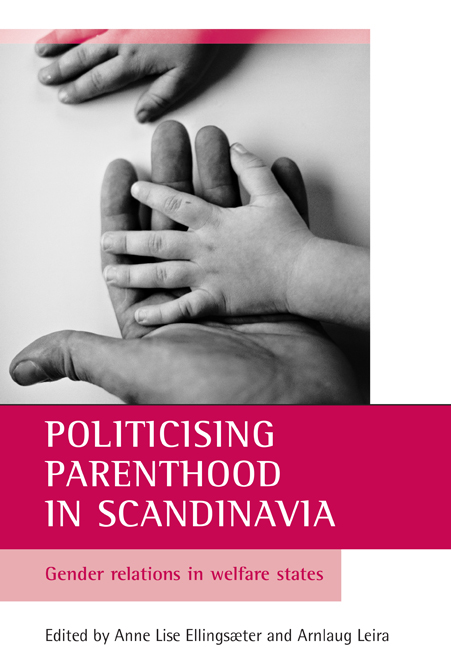Book contents
- Frontmatter
- Contents
- List of boxes, figures and tables
- Acknowledgements
- List of contributors
- one Introduction: politicising parenthood in Scandinavia
- Part One Politicising parenthood – legacies and challenges
- Part Two Gender equality and parental choice in welfare state redesign
- Part Three Work, family and the welfare state: redefining family models
- Index
twelve - Epilogue: Scandinavian policies of parenthood – a success story?
Published online by Cambridge University Press: 15 January 2022
- Frontmatter
- Contents
- List of boxes, figures and tables
- Acknowledgements
- List of contributors
- one Introduction: politicising parenthood in Scandinavia
- Part One Politicising parenthood – legacies and challenges
- Part Two Gender equality and parental choice in welfare state redesign
- Part Three Work, family and the welfare state: redefining family models
- Index
Summary
Since the early 1990s the Scandinavian welfare states have pursued wide-ranging parenthood policy reforms. Welfare state investment in the early childhood years, based on core programmes instituted in previous periods, has expanded in Denmark, Finland, Norway and Sweden, and public expenses for childcare have increased substantially. Policy innovations have been introduced; most notable are daddy quotas and more flexible uptake in parental leave arrangements. In general, childcare-related rights of parents and children have been strengthened (Leira, 2002). Paid parental leave has been prolonged. Cash grant schemes add to the entitlements of parents with young children in Finland and Norway. The Nordic countries are among those coming closest to meeting the European Union targets for childcare provision (European Communities, 2004). Childcare services are approaching universal coverage in Denmark and Sweden; the large majority of children under school age are enrolled in childcare institutions, including the under threes (Bergqvist and Nyberg, 2001; Borchorst, 2002; Leira, this volume). Despite considerable growth in coverage rates, in Norway demand still lags behind supply (Ellingsæter; Leira, this volume). In Finland all pre-school children have the right to attend state-sponsored childcare services, or alternatively, to receive a cash benefit for childcare (Salmi, this volume).
This study is set in a period that provided a new economic and cultural context for the Scandinavian welfare state model. Thus it is interesting to note that the expansion of parenthood policies took place during the troubled 1990s, a period of deep economic problems and labour market restructuring, and into the recovery of the early 2000s. In this period neoliberal currents, with particular emphasis on ‘flexibility’ and ‘choice’ got a stronger foothold in the welfare policy debate. In a period of economic austerity, as a main rule, work/family policy reform was not instituted to dismantle services or benefits. Welfare state approaches to families with young children show a remarkable continuity, although there were some cases of redesigning existing policy programmes, cuts in benefits, or slowing down of provision. However, in the few cases where benefits were not reduced, but abolished altogether, as happened to the cash grant for childcare in Sweden, and later, the daddy quota in Denmark, this was, arguably, due to a political shift in government, not a response to economic severity: a shift from a centre-right to a social democratic government in the first case, and the other way around in the latter.
- Type
- Chapter
- Information
- Politicising Parenthood in ScandinaviaGender Relations in Welfare States, pp. 265 - 278Publisher: Bristol University PressPrint publication year: 2006

